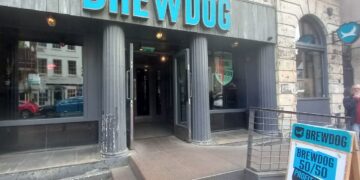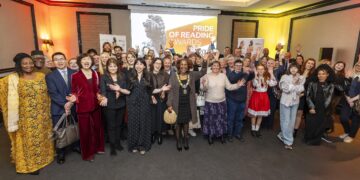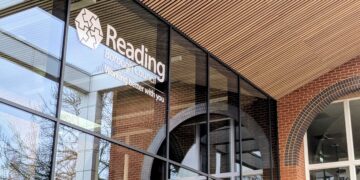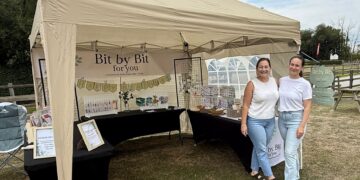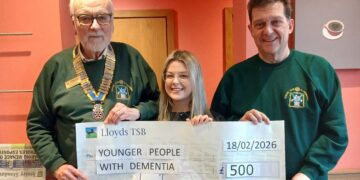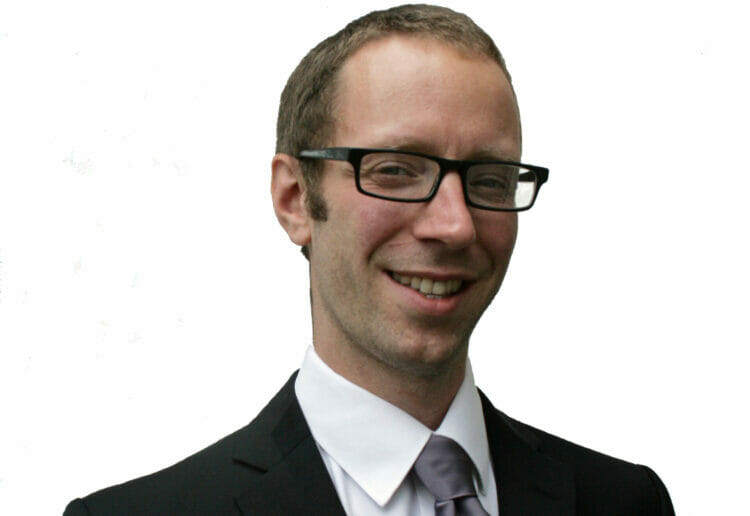THE 2022 local elections were a landmark year for Reading’s Green party – they became the official opposition after making enough gains to overtake the Conservatives, seven seats to six.
It’s been a long journey for the party, with leader Rob White first standing in Park ward in 2004, winning the seat for the first time in 2010, and then slowly seeing the east Reading seat become a Green fortress and spreading from there.
This year, they are hoping to make more gains, and are standing a full slate of candidates.
“We’re hoping that our hard work will return more Green councillors this year and we’ll be able to consolidate our position in second place on Reading Council, working hard hold Labour to account, ahead of the Conservatives,” says Rob.
What does he feel his party’s biggest achievements over the past 12 months as official opposition?
“We’ve been holding Labour to account, raising important issues,” he says. “Reading Council under Labour is only delivering a third of the affordable housing their own needs assessment says they should be delivering.
“We’ve been raising the fact that, unfortunately, inequality in the town, poverty in the town, is on the increase. We’ve been working really hard to give a voice to those issues.
“We’ve also been working really hard in our wards.”
This has included problems with bin collections, pushing for outdoor gym equipment in Palmer Park, petitioning to get Wokingham Road’s rubbish mountains resolved, and also keeping a check on air pollution levels.
“We’ve been working really hard as the main opposition party in the council chamber, raising issues, and using the increasing number of councillors we have to get more done in their wards,” he adds.
The Green Party manifesto has 12 points, among them is a desire to improve the council’s tree strategy.
“The council has been letting voters down,” says Rob. “They’ve not been monitoring the number of trees they’ve been putting in. We’ve got them to increase the target, but they’re not measuring it. We’d like to see more improvements to wildlife habitats, and make the town greener, taking advantage of the lovely environment we have in Reading.
“Walk through any green space in Reading and you see overflowing bins, you see litter. Walking around terraced homes, there are piles of fly-tipping, piles of rubbish, overflowing bins blowing all around the place.
“It doesn’t make you feel particularly proud when you see the state of the town, and it’s linked to the increase in rat numbers the council have received reports of.”
Rob singles out the Wokingham Road area as a bit of a ‘wild west’, saying the council has neglected the area.
“They’ve not been ensuring the traders have the correct size bins, they’re not fining residents or shopkeepers when their bins have been overflowing,” he says. “Because the council hasn’t been keeping on top of enforcement, that has meant the waste problems have got worse and worse and worse.
“In terrace homes, the smaller bins were just sort of dropped from the sky. People didn’t know it was happening until the bins were changed. That meant larger homes, HMOs, ended up with a smaller bin, so they haven’t got enough capacity.
“Some of those larger homes can get additional bins, but because it wasn’t communicated to residents they’re trying to make do with inadequate bins, that means they overflow, and some people dump rubbish.”
He wants the council to get better with its communications and enforcement actions.
“I’ve got residents contacting me on a weekly basis raising these important issues. It’s a clear council failure that we’re trying to get corrected.”
On doorstep glass collection, which is expected to become a government mandatory standard after the local elections, Rob says his party has been campaigning for this for “many, many years”.
“I’m glad central government is now singing from the same hymn sheet,” he says. “Other local authorities introduced a doorstep glass collection service 20 or 10 years ago and Reading still doesn’t. Now they’re saying they’re waiting for the government scheme. We could have been doing 20 years ago if they had prioritised it.
“It shows that if Green councillors work hard and lobby on things, they’re not fashionable to start off with, but they do come along eventually. We’ll continue to do that and make no apologies for it.”
The party also wants to prioritise residents’ mental health and tackling drug and alcohol dependency. It’s something Rob says is a real issue across the town.
“On a regular basis, I get contacted by residents who are suffering from problems, whose children are suffering and they’re struggling to get the support they really need. We’d like to see the council work closer with CAMHS, and more support for the voluntary sector. We think the council really needs to work hard at this.”
What about the Greens policy on roads? They want more 20mph speed limits – but some motorists will argue there’s no need as traffic moves so slowly anyway.
“On some roads 20mph would be a dream with all the congestion and roadworks,” he jokes, before adding: “In residential areas where we’ve introduced 20mph residents really like it. It calms the roads down and improves transport for people who are walking or cycling.
“It really is a game changer. I think 20mph across the whole town is what we need. Now, a driver is going from a 30mph to a 20mph zone and you’re chopping and changing. We need some consistency.”
He particularly wants to see action taken to make Kings Road safer, especially the area around Reading College – “It’s got an horrendous safety record, we think a 20mph zone would help change the culture of speed along that road and improve things for residents and young people.”
And he also has an ire over the Sidmouth Street cycle lane “a lane to nowhere”.
“It’s hardly ever been used and the road space has been cut into for no obvious benefit to anyone,” he adds.
Rob would like to see some of the active travel funds spent on improving pavements, crossings and potholes, while also looking at boosting cycling measures.
“Greens do support public transport, we’d like to see cheaper, more affordable public transport,” he adds, citing the Purple 17 route as a good example as it is so frequent he doesn’t bother to check its timetables.
“It’s the price of bus travel that puts people off. Greens in Scotland introduced free bus travel for young people and that’s the sort of thing we’d like to see in Reading.”
The Greens have a policy of trying to improve insulation in Reading homes, but as many of them are terraced homes built to Victorian standards, that is harder than it looks. Is pushing this policy a waste of time and money?
Rob disagrees: “With the cost-of-living crisis, we need to be insulating around 4,000 houses a year to meet our climate change targets and to help people who are struggling at the moment.
“The council, because of a lack of capacity in the housing team, handed back £500,000 of insulation money, which was a real disappointment – that could have been spent insulating people’s houses. There are a lot of people who don’t have loft insulation.
“The council need to make a start on this, they need to build up the workforce, to be creating the green jobs, and working out how to do it as cheaply as possible, tapping into government sources of funding. We’ll keep pushing for that.”
The Greens also have policies aimed at supporting the town’s rough sleepers, and helping those on the council house waiting lists.
“I’m getting an increasing amount of casework I’ve got from residents who just can’t afford their rent anymore, as they are being hiked. It is a national issue and a tough one to tackle, but there are things the council could be doing.”
Rob says the party’s big vision is to see Reading as a fairer, greener, and cleaner town.
“We’d like to see a town where you are living in a nice, well-insulated home, you’re warm in the winter, you’re comfortable and relaxed.
“When you step outside the home, we want to see strong communities where people know their neighbours, streets aren’t filled with rubbish and we have a public transport system that is affordable.
“We’d like to see decent cycle lanes that join up, crossings that prioritise pedestrians so you can get around to good quality shops and services.
“We’d like to see public services that are there supporting you when you need them, and just running nicely in the background, you don’t have to think about them because it just works.
“We’d like to see a strong local economy and Reading as the green capital of the Thames Valley.
“We’d like to see a council that is using its massive procurement budget to spend on Reading businesses to boost the local economy.”
He reiterates that every Green candidate standing is “a hardworking, good person who will represent you well on the council.
“You should vote Green as we work hard all year round. We can hold Labour to account and make a real difference, improving things for you and your family, and everyone in the town.”


